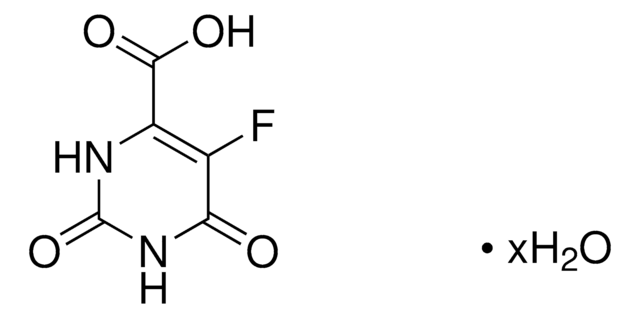F5013
5-Fluoroorotic acid hydrate
≥98%
Synonym(s):
2,6-Dihydroxy-5-fluoropyrimidine-4-carboxylic acid, 5-Fluorouracil-4-carboxylic acid
About This Item
Recommended Products
biological source
synthetic
Quality Level
Assay
≥98%
form
powder
technique(s)
cell culture | plant: suitable
mp
278 °C (dec.) (lit.)
solubility
4 M NH4OH: 50 mg/mL, clear, colorless to light yellow
storage temp.
−20°C
SMILES string
OC(C(NC(N1)=O)=C(F)C1=O)=O.[H]O[H]
InChI
1S/C5H3FN2O4.H2O/c6-1-2(4(10)11)7-5(12)8-3(1)9;/h(H,10,11)(H2,7,8,9,12);1H2
InChI key
LODRRYMGPWQCTR-UHFFFAOYSA-N
Looking for similar products? Visit Product Comparison Guide
Related Categories
Application
Biochem/physiol Actions
Signal Word
Warning
Hazard Statements
Precautionary Statements
Hazard Classifications
Acute Tox. 4 Oral - Eye Irrit. 2 - Skin Irrit. 2 - STOT SE 3
Target Organs
Respiratory system
Storage Class Code
11 - Combustible Solids
WGK
WGK 3
Flash Point(F)
Not applicable
Flash Point(C)
Not applicable
Personal Protective Equipment
Certificates of Analysis (COA)
Search for Certificates of Analysis (COA) by entering the products Lot/Batch Number. Lot and Batch Numbers can be found on a product’s label following the words ‘Lot’ or ‘Batch’.
Already Own This Product?
Find documentation for the products that you have recently purchased in the Document Library.
Customers Also Viewed
Our team of scientists has experience in all areas of research including Life Science, Material Science, Chemical Synthesis, Chromatography, Analytical and many others.
Contact Technical Service











